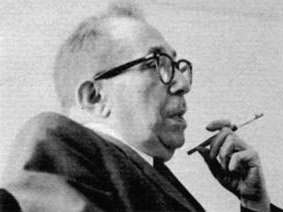A BRIEF LOOK INTO LEO STRAUSS PHILOSOPHY
People with the intellect, acuity, and, if necessary, the political commitment, polemical skills, and, above all, the imagination to find the evidence that career intelligence officers could not detect.
The "right" man for Deputy Defense Secretary Paul Wolfowitz, suggests Seymour Hersh in his recent New Yorker article entitled 'Selective Intelligence,' was Abram Shulsky, director of the Office of Special Plans (OSP) – an agency created specifically to find the evidence of WMDs and/or links with Al Qaeda, piece it together, and clinch the case for the invasion of Iraq.
Like Wolfowitz, Shulsky is a student of an obscure German Jewish political philosopher named Leo Strauss who arrived in the United States in 1938. Strauss taught at several major universities, including Wolfowitz and Shulsky's alma mater, the University of Chicago, before his death in 1973.
Strauss is a popular figure among the neoconservatives. Adherents of his ideas include prominent figures both within and outside the administration. They include 'Weekly Standard' editor William Kristol; his father and indeed the godfather of the neoconservative movement, Irving Kristol; the new Undersecretary of Defense for Intelligence, Stephen Cambone, a number of senior fellows at the American Enterprise Institute (AEI) (home to former Defense Policy Board chairman Richard Perle and Lynne Cheney), and Gary Schmitt, the director of the influential Project for the New American Century (PNAC), which is chaired by Kristol the Younger.
Strauss' philosophy is hardly incidental to the strategy and mindset adopted by these men – as is obvious in Shulsky's 1999 essay titled "Leo Strauss and the World of Intelligence (By Which We Do Not Mean Nous)" (in Greek philosophy the term nous denotes the highest form of rationality). As Hersh notes in his article, Shulsky and his co-author Schmitt "criticize America's intelligencecommunity for its failure to appreciate the duplicitous nature of the regimes it deals with, its susceptibility to social-science notions of proof, and its inability to cope with deliberate concealment." They argued that Strauss's idea of hidden meaning, "alerts one to the possibility that political life may be closely linked to deception. Indeed, it suggests that deception is the norm in political life, and the hope, to say nothing of the expectation, of establishing a politics that can dispense with it is the exception."
It's hardly surprising then why Strauss is so popular in an administration obsessed with secrecy, especially when it comes to matters of foreign policy. Not only did Strauss have few qualms about using deception in politics, he saw it as a necessity. While professing deep respect for American democracy, Strauss believed that societies should be hierarchical – divided between an elite who should lead, and the masses who should follow. But unlike fellow elitists likePlato, he was less concerned with the moral character of these leaders. According to Shadia Drury, who teaches politics at the University of Calgary, Strauss believed that "those who are fit to rule are those who realize there is no morality and that there is only one natural right – the right of the superior to rule over the inferior."
Rule 1 Deception
This dichotomy requires "perpetual deception" between the rulers and the ruled, according to Drury. Robert Locke, another Strauss analyst says,"The people are told what they need to know and no more." While the elite few are capable of absorbing the absence of any moral truth, Strauss thought, the masses could not cope. If exposed to the absence of absolute truth, they would quickly fall into nihilism or anarchy, according to Drury, author of 'Leo Strauss and the American Right' (St. Martin's 1999).

No comments:
Post a Comment